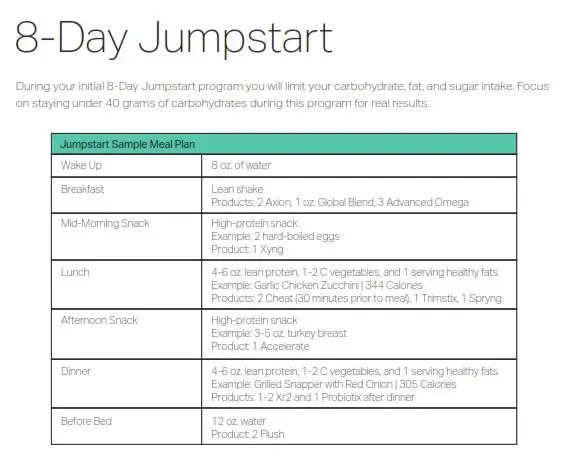7 Safe and Effective Ways: Jumpstart Diet for Weight Loss
Do you want to begin your weight-loss journey and achieve what it takes to get into perfect shape? This blog post will not only answer your question but also explore seven safe strategies that can help you start a diet for weight loss. Whether it means developing good habits or experiencing new workouts, we provide all the guidelines necessary for embarking on a healthy lifestyle. Forget fad diets and unsustainable approaches; let us take charge of our wellbeing and witness actual impacts.

Introduction: The struggle with weight loss: Jumpstart Diet
Many people in modern society desire weight loss. Due to the influence of social media and societal expectations, there is constant pressure to comply with specific body standards. However, weight loss is not just about looks; Our health and wellbeing can be significantly affected by it. The battle against extra pounds usually starts with a motive to shed them off swiftly and effortlessly. Quick results are expected by some individuals who go into fad diets or extreme exercises. Nonetheless, they are unsustainable approaches that often do more harm than good.
Another challenge facing those trying to lose weight is the vast amount of information and conflicting advice available online. There are so many diet trends and exercise routines—which ones really work? Furthermore, genetics and individual body composition play pivotal roles in determining our ability to lose weight. Some people have slower metabolisms or hormonal imbalances that hinder them from losing weight faster than others. The struggle with weight loss goes beyond physical aspects. Emotions significantly affect one’s relationship with food and body image. Stress, boredom, sadness, or even happiness might cause overeating or unhealthy food choices.
However, it should be noted that failure to achieve the desired results or obstacles during the process of losing extra pounds can negatively affect one’s mental condition as well. Such feelings may include frustration, disappointment, and even doubt. However, we must remember that each person’s journey towards losing weight is different; thus, there cannot be a universal solution that applies to all cases at once. What works for one person may not necessarily work for another.
In this blog post, we will look at safe ways to start your journey to losing weight without engaging in extreme measures or falling victim to misinformation. These methods are scientifically backed up and focus on building healthy habits instead of quick fixes. Weight loss must be seen as a lifestyle change rather than a short-term goal. With small, sustainable changes to your diet and exercise routine, you can achieve longer-lasting results while improving your overall health and wellbeing.
Here are some tips and strategies for safely starting your weight loss journey. So, let’s get started on this exciting journey towards a healthier and happier you!
Understanding the need for a jump-start diet
Beginning a weight reduction journey might be burdensome and scary, particularly when you have had difficulties with your body mass before. You may have tried different diets and workout plans but with no noticeable changes, which may make you feel very frustrated and hopeless.
This is the point at which we require a jumpstart. It is an important part of your weight loss program that will help you on this journey and provide you with the impetus to achieve what you aspire for. So why do we specifically need a jumpstart?
- Breakthrough Plateaus: Sometimes, people stop making progress in losing weight despite sticking to their diet plan meticulously during their weight loss expedition. This could be more encouraging. However, introducing a kickstart can break these plateaus, allowing one to achieve one’s desired weight.
- Boosting Motivation: There’s no doubt that keeping motivated while shedding extra pounds is not easy. The beginning push of a kickstart leads to instantaneous outcomes, hence increasing motivation.
- Establish Healthy Habits: Commencing your diet with some weight loss lets you begin by developing healthy habits, which set the tone for long-term success. Good eating habits and working out right from the start make it easier for someone to continue doing so in the future.
- Increased Confidence: Jumpstarting can also improve self-esteem among people since they see quick results. This increased confidence can lead to more determination and dedication towards losing weight.
- Improved Health: Losing excess fat has health benefits beyond helping one lose extra kilos, including lowering one’s chances of developing diseases such as diabetes, heart disease, or stroke.
Now that we know why we need a jump start, what are some ways in which we can implement one into our weight loss journey?
Firstly, it’s important to set achievable goals when beginning this process—whether it’s losing ten pounds within four weeks or adopting better eating habits. This will keep your focus strong throughout the process.
Next, a safe and efficient way to begin your journey to weight loss through jumps has to be chosen. Crash diets or excessive workout programs can give you fast results, but they need to be more sustainable and may harm your health. Instead, go for a mix of healthy eating, regular workouts, and enough sleep.
Remember the importance of consistency and patience. Losing weight is a slow process, and it is crucial to trust the process and let your body adapt. Progress may be slow, but it is still progress, and each step you take toward healthier ways is an accomplishment in itself.
Understanding, therefore, why one needs a jump start in their weight loss journey can help them with their overall success. It gives the initial push needed to get things moving; it helps break through plateaus; it allows us to establish healthy habits; it boosts confidence levels; and it improves general health. With dedication and commitment to implementing
Seven safe and effective ways to jumpstart diet for your weight loss journey:
It’s important to start weight loss safely and effectively. Crash diets and extreme exercise regimens may guarantee rapid outcomes, but they usually result in unsustainable weight loss and can be hazardous to health. Consider making lifestyle changes that will promote gradual and steady weight loss instead.
Below are some safe and effective ways to jumpstart your weight-loss journey:
- Set realistic goals: Before beginning a weight loss program, set realistic goals. This implies that you need to recognize where you presently stand regarding body size, fitness level, and general wellbeing and come up with attainable targets for improvement with a healthcare professional. A physician or registered dietitian should always be consulted before embarking on any new diet or exercise regimen. In addition to providing personalized recommendations for safe and effective weight loss, they can also assess your current health status.
- Focus on nutrition: While regular exercise is significant for overall health, success in shedding off extra pounds depends mainly upon proper nutrition. A healthy diet with fruits, veggies, lean proteins, whole grains, and healthy fats is beneficial.
- Practice portion control: Portion sizes have increased greatly over the years, leading to overeating and, eventually, obesity. Develop an understanding of correct serving sizes by measuring your portions using measuring cups or food scales until you can measure them accurately without help.
- Incorporate physical activity into daily routine. Exercise not only burns calories but also improves overall health. Try jogging, dancing, or cycling regularly, aiming for 30 minutes of medium-intensity exercise per day.
- Stay hydrated. Apart from facilitating fat metabolism, other essential body processes necessitate adequate water intake throughout the day. Drink at least eight glasses per day, if not more, for those who engage in rigorous exercises.
- Be mindful of snacking habits. Snacking can easily lead to overeating and consuming excess calories. Other options that avoid snacking at all could be going for a walk or reading a book.
- Avoid crash diets: Although crash diets can promise immediate weight loss, they are not of long-term continuity and may even damage your health. Make gradual changes that you can maintain for the rest of your life.
Safe and effective weight loss is not just about getting rid of the extra pounds but rather creating healthy habits and making sustainable lifestyle changes. It’s important to prioritize nutrition, consult with professionals when necessary, and avoid extreme measures that may harm your health in the long run.

Following these tips can accelerate weight loss.
Cleanse your body with a detox.
The first and most vital step in starting your weight-loss journey is detoxification. This procedure involves removing toxic substances and impurities that have accumulated in your body, which can harm your efforts to lose weight and overall health.
Toxins may come from a variety of sources, including processed foods, pollution, alcohol, medicines, and stress. These toxins accumulate slowly over time in our organs and tissues, leading to fatigue, bloating, skin problems, and a weakened immune system. Detoxification, however, helps relieve the stress by giving our organs a break from working all day to filter out these dangerous materials.
There are myriad ways to detoxify the body. Nevertheless, it is important to opt for a safe method that does not cause harm or discomfort. Some popular options include juice cleanses, elimination diets, fasting, and herbal supplements.
Juice cleanses involve drinking only juices made from fruits and vegetables for some days. Thus, the digestive system rests while supplying nutrients necessary for the body. However, juice cleanses should be done under healthcare supervision, as they might not be appropriate for everyone.
On the other hand, an elimination diet focuses on removing certain foods or food groups known to cause inflammation or sensitivities in the body. This approach helps identify trigger foods that may be causing bloating or other digestive issues.
Fasting involves going without solid food for long periods but keeping yourself hydrated with water or herbal teas. It enables digestion to reset itself, thereby promoting healing throughout the whole body.
Herbal supplements boost liver function by enhancing toxin elimination. These supplements are taken daily throughout a cleanup period, though they should also be utilized with professional guidance.
However you decide to perform your detoxifying process, do remember this: crucially important is heeding your body’s calls while detoxing. It’s normal to feel uncomfortable at first as your body adapts. However, if any unusual symptoms occur or if discomfort persists for a long period, it is important to consult a doctor.
Apart from cleansing your body, you should also support the process by drinking enough water and including whole, nutrient-dense foods in your diet. To stay healthy, drink water and eat fruits, veggies, lean protein, and healthy fats. Detox is great for weight loss. Always select the method that best suits you and listen to what your body tells you throughout this period.
Incorporate HIIT workouts into your routine.
As a way to burn calories and increase metabolism, high-intensity interval training, or HIIT, has gained popularity. This involves short bursts of intense exercise separated by periods of rest or low-intensity activity. For those who want fast results, HIIT can be the game changer in their weight loss journey. Here’s why:
- Burns More Calories in Less Time: When compared to traditional steady-state cardio exercises, HIIT burns more calories in a shorter period. High-intensity intervals cause your body to work hard, resulting in high-calorie burns during and after exercises.
- Increases Metabolism: It has been shown that HIIT increases metabolic rate, so you burn calories even after stopping exercising. Excess post-exercise oxygen consumption (EPOC) is the term used to describe this effect.
- No Equipment Needed: Another reason people love HIIT is that it doesn’t require any equipment; they perform it at home or any other place without necessarily being inside a gym. Simple bodyweight exercises like burpees, squats, and jumping jacks can be done as part of a HIIT routine, thereby providing a full-body workout.
- Versatility: Incorporating this into your fitness plan has quite a number of benefits, including versatility. Different workouts, exercises, or intervals can be mixed and matched according to personal fitness levels or preferences, meaning they suit everyone, from beginners to advanced individuals.
- Boosts Heart Health: In addition to fat burning, cardiovascular health improves due to an increased heart rate throughout the high-intensity intervals, which allows the heart rate to decrease during the rest phase.
- Can Be Modified for Any Fitness Level: Despite its high-intensity nature, one should not get scared away by HIIT because it’s easy enough for all fitness levels. For beginners, one could reduce their duration and increase resting time between them, while more fit people can make every interval longer and more intense.
Therefore, HIIT is a safe way to start losing weight. Nevertheless, it is important to remember that, as with any exercise program, you must start slowly and build up gradually to avoid injury. Always seek advice from certified personal trainers before trying any new exercise routines.
It’s worth remembering that consistency is everything when it comes to achieving results. Weight loss & health benefits with weekly HIIT & other exercise. With determination and commitment, fitting HIIT into one’s schedule would bring one closer to reaching their weight loss target.
Try intermittent fasting
Weight loss with intermittent fasting has become increasingly popular in recent years. It involves alternate periods of fasting and eating. 16/8 is the most common method, which requires 16 hours of fasting followed by 8 hours of eating.
It is very simple, which is one of the main benefits of intermittent fasting as opposed to conventional diets, which involve rigorous counting of calories or elimination of entire food groups. Intermittent fasting concentrates on when rather than what you eat. In this regard, it can be easier to follow and maintain over time.
Additionally, intermittent fasting may result in significant weight loss, especially around stubborn areas like the belly. By limiting one’s time to eat, the body is forced to tap its fat stores during the fasting period due to depletion in the carbohydrate supply.
Intermittent fasting also enhances overall metabolic health by decreasing insulin resistance, increasing human growth hormone levels, and reducing blood sugar levels. It’s also been linked with improvements in mental functioning and extended life expectancy.
Therefore, how do you integrate intermittent fasting into your weight-loss routine? The first step is choosing an appropriate feeding window that suits your schedule and lifestyle. Some prefer skipping breakfast, given that their first meal will come during lunch, while others skip dinner instead. Keep trying out different alternatives until you find what works best for you.
Consume nutrient-dense whole foods during your feeding window, such as lean proteins, healthy fats, fruits, vegetables, and complex carbohydrates.
One should also avoid excessive food consumption within their eating window since this would render any possible benefits from intermittent fasting futile. Be aware of the amount you are consuming at a single point, taking note of your hunger cues rather than indulging in food mindlessly throughout the entire day. It is important to take a break from intermittent fasting at least once per week.
For weight loss, intermittent fasting can be safe and effective. Nonetheless, just like any other dietary plan, you must listen to your body and ensure that it meets your individual needs and preferences. Always consult with a healthcare professional before making significant changes to your diet.
Focus on whole, nutrient-dense foods.
To lose weight, it is highly recommended to consider the quality of the food you consume instead of just the quantity. This entails turning one’s attention to whole, nutritious foods that not only help in losing weight but also provide essential vitamins and minerals for general wellbeing.
- Foods are high in fiber: Whole foods are those that have yet to be highly manufactured, leaving them unaltered with nutrients. They consist of fruits, vegetables, whole grains, lean proteins, and healthy fats. Such foods are high in fiber, antioxidants, and other important substances that support weight loss by increasing satiety and reducing cravings.
- Processed foods: On the other hand, processed foods generally contain extra sugars, unhealthy fats, and lots of sodium, which impede attempts to shed some kilos. Crucially, these products lack vital nutrients and may cause overeating since they are addictive.
- Veggies: Veggies that aren’t starchy should make up half the plate. Leafy greens, broccoli, bell peppers, carrots, and beets are low in calories and high in nutrients such as vitamins K, C, B6, A, folic acid, magnesium, and potassium.
- Choose lean protein sources: Consider options like skinless chicken breast, turkey breast, eggs, tofu, lentils, and beans, among others. These will keep you feeling full while also providing amino acids for muscle building.
- Complex carbohydrates should also feature: Whole grains such as quinoa, brown rice, oats, buckwheat, and popcorn are great examples of slow-burning complex carbohydrates that provide energy throughout the day. Healthy fats are good for you. Incorporating avocado, nuts, and olive oil into your dishes can give you a feeling of fullness, thus minimizing hunger pangs when tempted to eat unhealthy snacks.
- No added sugar: Avoid sweet beverages and treats made from artificial sugar. Instead, try natural sweeteners like fruit or small amounts of honey or syrup.
In addition to whole foods, you also need to be mindful of portion sizes. Use smaller plates and bowls for a more substantial meal. You can also keep a food diary or use an app that tracks calories to make sure you are eating within the recommended range and ensuring proper nutrition.
Moreover, the main focus should be on incorporating whole, nutritious foods into one’s diet as one begins their journey towards weight loss. This not only helps shed unwanted pounds but also improves overall health and wellness. Bear in mind that losing weight sustainably takes time, so don’t rush yourself through it. Enjoy feeding your body good-quality food.

Cut out added sugars and processed foods.
When people try to lose weight, many don’t bother themselves too much with their diet, which is one of the most common mistakes. Though necessary, exercise is not enough; what you eat plays a major part in this process. Eating added sugars and processed foods is one of the main reasons why people fail to lose excess weight.
Added sugars are those that are not found in food naturally but are added during processing or preparation. They come in various forms, such as high-fructose corn syrup, sucrose, glucose, and fructose. They contain calories without any nutrients, making it easier for an individual to consume more energy than the body needs.
Foods that have been processed are those that have been altered from their natural state in any way, such as by canning, freezing, dehydrating, or adding preservatives. They are often high in sugar, unhealthy fats, and sodium, resulting in weight gain.
One thing you should remember while trying to eliminate added sugars and processed foods is to read your food labels thoroughly. Other places where sugar may be present include condiments, sauces, breakfast cereals, and even seemingly healthy snacks like granola bars.
To reduce your intake of added sugars and processed foods, start by incorporating whole foods into your diet. These are either minimally processed or not processed at all. They include fruits, vegetables, lean protein sources (chicken breasts/fish), and whole grains (oats/brown rice). These options have plenty of essential vitamins, minerals, and fiber needed for a healthy body while making sure you do not feel hungry quickly.
The best way to reduce added sugars is to substitute refined white sugar with natural sweeteners like honey or maple syrup. Ditch sugary drinks for water or unsweetened tea since these drinks have hidden calories that quickly accumulate.
Aside from avoiding added sugars and processed foods, portion control is also important. Even the most nutritious whole foods can cause weight gain if consumed in excessive amounts. Use smaller plates and measure portions to consume only what is needed.
Eliminating added sugars and processed foods from your meals will jumpstart your weight loss program and improve your overall health. Remember that moderation is key, so allow yourself the occasional treat, but make sure it fits into your daily calorie intake.

Get enough sleep and manage stress levels.
Weight loss is often ignored when it comes to enough sleep and stress management, yet they all matter for a healthy weight. Being deprived of rest or always under tension can result in many health difficulties, including obesity.
Firstly, let’s discuss why sleep is important for losing weight. Furthermore, not enough sleep disturbs our metabolism, leading to inefficient calorie-burning processes.
To ensure enough recuperative sleep cycles, experts recommend adults get 7-9 hours of sleep every night. You can regulate your body’s internal clock by going to bed at the same time each night, which will also improve your sleeping habits.
Next, we address managing stress as an essential part of successful weight loss. Chronic stress releases cortisol, a stress hormone, which encourages fat storage in the abdominal area and emotional eating as a way to cope. It is critical that you manage your stress effectively in order to lose weight effectively. Meditation, deep breathing, and other mindfulness practices, as well as physical activities like yoga and jogging, can help.
Moreover, infusing relaxation strategies into your everyday program will help lower overall levels of pressure. Stepping away from work on a regular basis or taking some moments alone every day relieves anxiety and enhances wellbeing.
Sleeping enough and managing levels of strain are integral to starting one’s journey of losing weight safely but surely. By making these considerations first, one stands a higher chance of succeeding with their goals related to reducing pounds and living healthy lifestyles, generally speaking. Remember that, as far as good health is concerned, it is equally vital to look after your mind as it is to look after your body.
Consult a healthcare professional or nutritionist.
A healthcare provider or nutritionist should be consulted before starting any weight-loss program. They may give you individualized advice based on your current health, eating habits, and weight loss goals. Furthermore, they can help you determine if any hidden medical conditions might affect your progress in shedding some pounds.
Likewise, a health professional will assess your general wellbeing to ascertain that beginning a weight loss program suits you physically; this could involve carrying out blood tests for nutrient deficiencies and hormonal imbalances as hindrances. The above information is vital in the development of an effective and safe weight reduction scheme that meets the particular requirements of the concerned client.
Additionally, considering the services of a nutritionist would mean analyzing one’s eating patterns and advising on how to make better food choices. They can teach you about balanced diets, portion control, and the importance of all food groups when it comes to dieting. Their knowledge of nutritional science may also allow them to recommend supplements or dietary plans that correspond with the target weight set.
Besides, seeing a healthcare practitioner or nutritionist will not only lead to healthy weight reductions through non-crash diets or excessive measures. They will also help monitor your progress and make adjustments whenever necessary throughout your journey.
Also, these professionals help address mental health during the weight loss process rather than just focusing on physical aspects alone. Part of sustainable weight loss is creating positive associations with food while managing emotional triggers related to food consumption patterns. These experts can guide mindful eating techniques as well as coping mechanisms for stress relief purposes.
However, seeking professional advice does not mean relinquishing ownership over one’s body or depending solely on external sources for success. On the contrary, it serves as an additional level of support and knowledge that assists individuals in safely achieving their desired levels of wellness.
Expert advice from healthcare providers or nutritionists enhances efficiency and safety within one’s weight loss regime. They offer personalized guidance, deal with any hidden health problems, and support physical and mental wellbeing. One thing that should always be remembered is that healthy living comes first.



